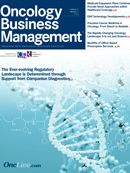Cancer Treatment Has a New Side Effect- Patient Financial Toxicity
Oncology practices can ease their patients' financial concerns by connecting them to financial counseling services.
OncLive Chairman,
Mike Hennessy
In today’s age of health reform, more patients are finding themselves on the hook for out-of-pocket medical expenses. Helping cancer patients manage the costs of their treatment can improve adherence. Consequently, oncology practices can ease their patients’ financial concerns by connecting them to financial counseling services, as seen in the cover story this month, “When the Patient Can’t Afford His Cancer Treatment.”
The Advisory Board Company, a global research, technology, and consulting firm, has provided tactics to help patients understand and manage their financial responsibilities. According to the company, the ideal financial navigation program helps patients understand the basics of health insurance and their own specific benefits. More than two-thirds of patients with cancer say they want to know their out-of-pocket costs before treatment. It’s this transparency that usually decreases their anxiety and increases the chances that they will pay for at least a portion of their care.
Practices should also identify and reach out to their patients who are eligible for new or improved health coverage. Coordinating the start of treatment with the start of coverage should be a goal in patient financial counseling.
Dan Sherman, the President and Founder of the NaVectis Group, which provides financial counseling services, says that even patients who have comprehensive coverage may struggle with out-ofpocket costs. But there are many external sources of financial support, with potential assistance coming from nonprofit organizations, pharmaceutical companies, and even individual donors.
An outcome measure to consider when providing financial counseling to patients with cancer is the COST (Comprehensive Score for Financial Toxicity) tool created by researchers from the University of Chicago. The 11-question tool measures a patient’s risk for, and ability to tolerate, financial stress. Researchers published their findings in the journal Cancer this past July.
Lead author Jonas de Souza, MD, said, “Few physicians discuss this increasingly significant side effect with their patients.” The rationale for developing the tool was simple: “Physicians aren’t trained to do this. We believe that a thoughtful, concise tool that could help predict a patient’s risk for financial toxicity might open the lines of communication. This gives us a way to launch that discussion.”
The tool originally consisted of 147 questions but was eventually pared down to 11 short and easy-to-understand statements that are brief enough to avoid annoying patients but thorough enough to obtain the needed financial information. Learning how a patient responds may help clinicians determine who is likely to need education, financial counseling, or referral to a support network. The tool also can help predict who is likely to have problems and require some interventions. The University of Chicago researchers report that a larger study to validate these findings is underway, which will correlate the newly developed scale with quality of life and anxiety in patients with cancer.
The cost burden to patients with cancer is an outcome that requires assessment, and “measuring this toxicity is the first step towards addressing this issue,” said de Souza. “It’s another important piece of information in the shared decision-making process.”




